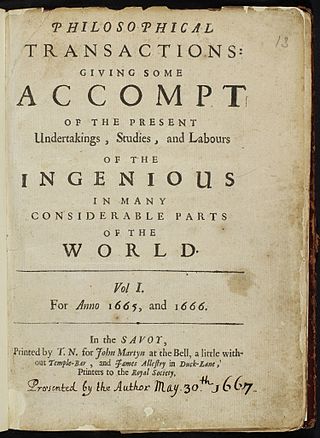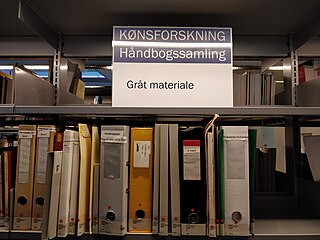
arXiv is an open-access repository of electronic preprints and postprints approved for posting after moderation, but not peer review. It consists of scientific papers in the fields of mathematics, physics, astronomy, electrical engineering, computer science, quantitative biology, statistics, mathematical finance, and economics, which can be accessed online. In many fields of mathematics and physics, almost all scientific papers are self-archived on the arXiv repository before publication in a peer-reviewed journal. Some publishers also grant permission for authors to archive the peer-reviewed postprint. Begun on August 14, 1991, arXiv.org passed the half-million-article milestone on October 3, 2008, had hit a million by the end of 2014 and two million by the end of 2021. As of November 2024, the submission rate is about 24,000 articles per month.

The Open Archives Initiative (OAI) was an informal organization, in the circle around the colleagues Herbert Van de Sompel, Carl Lagoze, Michael L. Nelson and Simeon Warner, to develop and apply technical interoperability standards for archives to share catalogue information (metadata). The group got together in the late late 1990s and was active for around twenty years. OAI coordinated in particular three specification activities: OAI-PMH, OAI-ORE and ResourceSync. All along the group worked towards building a "low-barrier interoperability framework" for archives containing digital content to allow people harvest metadata. Such sets of metadata are since then harvested to provide "value-added services", often by combining different data sets.

In academic publishing, a preprint is a version of a scholarly or scientific paper that precedes formal peer review and publication in a peer-reviewed scholarly or scientific journal. The preprint may be available, often as a non-typeset version available free, before or after a paper is published in a journal.
CiteSeerX is a public search engine and digital library for scientific and academic papers, primarily in the fields of computer and information science.

Open access (OA) is a set of principles and a range of practices through which nominally copyrightable publications are delivered to readers free of access charges or other barriers. With open access strictly defined, or libre open access, barriers to copying or reuse are also reduced or removed by applying an open license for copyright, which regulates post-publication uses of the work.

Scientific literature encompasses a vast body of academic papers that spans various disciplines within the natural and social sciences. It primarily consists of academic papers that present original empirical research and theoretical contributions. These papers serve as essential sources of knowledge and are commonly referred to simply as "the literature" within specific research fields.
The Open Archives Initiative Protocol for Metadata Harvesting (OAI-PMH) is a protocol developed for harvesting metadata descriptions of records in an archive so that services can be built using metadata from many archives. An implementation of OAI-PMH must support representing metadata in Dublin Core, but may also support additional representations.
An institutional repository (IR) is an archive for collecting, preserving, and disseminating digital copies of the intellectual output of an institution, particularly a research institution. Academics also utilize their IRs for archiving published works to increase their visibility and collaboration with other academics. However, most of these outputs produced by universities are not effectively accessed and shared by researchers and other stakeholders. As a result academics should be involved in the implementation and development of an IR project so that they can learn the benefits and purpose of building an IR.

An academic conference or scientific conference is an event for researchers to present and discuss their scholarly work. Together with academic or scientific journals and preprint archives, conferences provide an important channel for exchange of information between researchers. Further benefits of participating in academic conferences include learning effects in terms of presentation skills and "academic habitus", receiving feedback from peers for one's own research, the possibility to engage in informal communication with peers about work opportunities and collaborations, and getting an overview of current research in one or more disciplines.
PubMed Central (PMC) is a free digital repository that archives open access full-text scholarly articles that have been published in biomedical and life sciences journals. As one of the major research databases developed by the National Center for Biotechnology Information (NCBI), PubMed Central is more than a document repository. Submissions to PMC are indexed and formatted for enhanced metadata, medical ontology, and unique identifiers which enrich the XML structured data for each article. Content within PMC can be linked to other NCBI databases and accessed via Entrez search and retrieval systems, further enhancing the public's ability to discover, read and build upon its biomedical knowledge.

Grey literature is material and research produced by organizations outside of the traditional commercial or academic publishing and distribution channels. Common grey literature publication types include reports, working papers, government documents, white papers and evaluations. Organizations that produce grey literature include government departments and agencies, civil society or non-governmental organizations, academic centres and departments, and private companies and consultants.
Digital Commons is a commercial, hosted institutional repository platform owned by RELX Group. This hosted service, licensed by bepress, is used by over 600 academic institutions, healthcare centers, public libraries, and research centers to showcase their scholarly output and special collections.
ScientificCommons was a project of the University of St. Gallen Institute for Media and Communications Management. The major aim of the project was to develop the world’s largest archive of scientific knowledge with fulltexts freely accessible to the public. The project was closed down in 2014.
EPrints is a free and open-source software package for building open access repositories that are compliant with the Open Archives Initiative Protocol for Metadata Harvesting (OAI-PMH). It shares many of the features commonly seen in document management systems, but is primarily used for institutional repositories and scientific journals. EPrints has been developed at the University of Southampton School of Electronics and Computer Science and released under the GPL-3.0-or-later license.
The OpenSIGLE repository provides open access to the bibliographic records of the former SIGLE database. The creation of the OpenSIGLE archive was decided by some major European STI centres, members of the former European network EAGLE for the collection and dissemination of grey literature. OpenSIGLE was developed by the French INIST-CNRS, with assistance from the German FIZ Karlsruhe and the Dutch Grey Literature Network Service (GreyNet). OpenSIGLE is hosted on an INIST-CNRS server at Nancy. Part of the open Access movement, OpenSIGLE is referenced by the international Directory of Open Access Repositories.
ZooKeys is a peer-reviewed open access scientific journal covering zoological taxonomy, phylogeny, and biogeography. It was established in 2008 and the founding editor-in-chief was Terry Erwin until his death in 2020. In December 2023, Torsten Dikow was appointed the new editor-in-chief. It is published by Pensoft Publishers.
A manuscript is the work that an author submits to a publisher, editor, or producer for publication. Especially in academic publishing, manuscript can also refer to an accepted document, reviewed but not yet in a final format, distributed in advance as a preprint.

bioRxiv is an open access preprint repository for the biological sciences co-founded by John Inglis and Richard Sever in November 2013. It is hosted by the Cold Spring Harbor Laboratory (CSHL).
The Open Knowledge Repository is the official open-access repository of the World Bank and features research content about development. It was launched in 2012, alongside the World Bank's Open Access Policy and its adoption of the Creative Commons Attribution license for all research and knowledge products that it publishes, which collectively made the World Bank the first international organization to completely embrace open access. The repository collects the intellectual output of the World Bank in digital form, disseminates it, and preserves it long-term.







